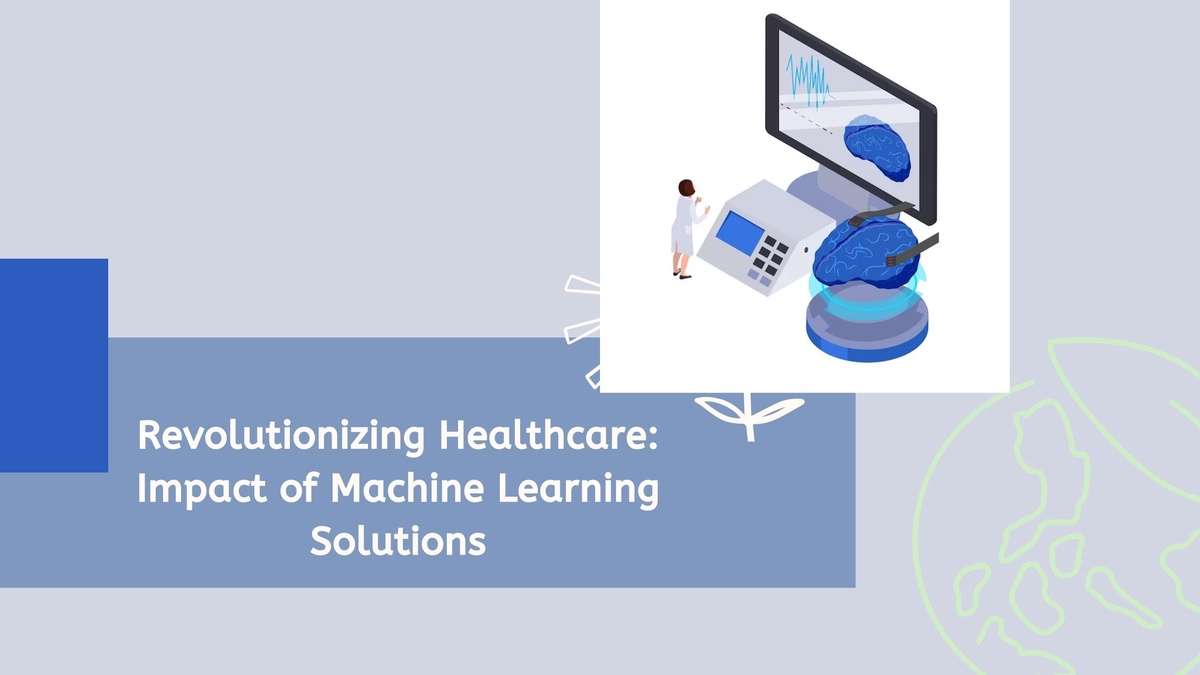The healthcare industry has long been a crucible of innovation and progress, constantly seeking new ways to improve patient care, diagnosis accuracy, and treatment efficacy. In recent years, one technological marvel has emerged as a powerful tool in this quest for better healthcare outcomes: machine learning. In this blog post, we'll delve into the world of machine learning development services and their profound impact on revolutionizing healthcare.
A Paradigm Shift in Diagnosis
Diagnosing medical conditions accurately and swiftly has always been a top priority in healthcare. Machine learning has introduced a paradigm shift in this domain, particularly in medical imaging. Radiologists, for example, are now equipped with AI-powered tools that can analyze medical images such as X-rays, CT scans, and MRIs with remarkable precision.
One of the most notable achievements of machine learning in healthcare imaging is its ability to detect anomalies and early signs of diseases. In breast cancer screening, machine learning models can identify subtle abnormalities in mammograms that might go unnoticed by the human eye. This not only improves diagnostic accuracy but also enables earlier intervention, potentially saving lives.
Predictive Analytics and Disease Prevention
Prevention is often more effective and cost-efficient than treatment, and machine learning excels in predictive analytics services, which can aid in disease prevention. By analyzing vast datasets containing patient information, machine learning algorithms can identify risk factors and predict disease occurrences.
For instance, predictive models can assess a person's risk of developing conditions like diabetes, heart disease, or hypertension based on their lifestyle, genetics, and medical history. Healthcare providers can then tailor preventive measures and interventions to mitigate these risks, leading to healthier outcomes and reduced healthcare costs.
Personalized Treatment Plans
One of the most promising aspects of machine learning in healthcare is the ability to develop personalized treatment plans. Every patient is unique, and what works for one person may not be as effective for another. Machine learning leverages patient data to create treatment strategies that are tailored to individual needs.
In the field of oncology, for instance, machine learning algorithms can analyze a patient's genetic profile and tumor characteristics to determine the most suitable cancer treatment. This approach, known as precision medicine, can maximize treatment effectiveness while minimizing side effects.
Drug Discovery and Development
The process of drug discovery and development is traditionally time-consuming and costly. Machine learning is accelerating this process by analyzing biological data, identifying potential drug candidates, and predicting their effectiveness.
By analyzing vast datasets containing information about molecular structures, disease pathways, and genetic factors, machine learning algorithms can suggest novel drug compounds that have a higher likelihood of success. This not only reduces the time and cost of drug development but also opens up new possibilities for treating diseases that were previously challenging to address.
Enhanced Patient Engagement
Machine learning is not limited to clinical settings; it also has the potential to enhance patient engagement and self-management. Mobile health apps and wearable devices equipped with machine learning capabilities can provide real-time feedback and insights to patients.
These technologies can monitor vital signs, track medication adherence, and offer personalized health advice. By empowering patients to take a more active role in their healthcare, machine learning contributes to better health outcomes and improved quality of life.
Challenges and Ethical Considerations
While the impact of machine learning in healthcare is undeniably positive, it is not without challenges and ethical considerations. Privacy concerns, data security, and the potential for bias in algorithms are issues that must be carefully addressed. Additionally, healthcare professionals must be adequately trained to understand and work alongside machine learning systems.
In conclusion
Machine learning solutions are revolutionizing healthcare by improving diagnosis accuracy, enabling disease prevention, personalizing treatment plans, accelerating drug discovery, and enhancing patient engagement. These advancements are not only improving healthcare outcomes but also making healthcare more efficient and accessible.
As the healthcare industry continues to harness the power of machine learning, we can expect even more remarkable breakthroughs in the future. However, it is crucial to navigate the ethical and regulatory landscape carefully to ensure that these innovations benefit all patients while maintaining the highest standards of care. The journey towards a healthier and more technologically advanced healthcare system has only just begun, and machine learning is at the forefront of this transformation.


No comments yet